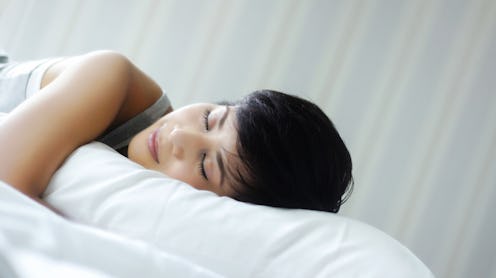Life
Science Says An Extra Half Hour Of Sleep Can Actually Make A Huge Difference In Your Day

Some people jump out of bed every morning ready to take on the world — but then there are those of us who smash the snooze button until we eventually stumble out of bed. It sometimes feel impossible to get enough rest every day, but it may not be your fault. How much sleep should you get a night? Most people think eight hours should just about do it for them, but there's actually a surprising reason you'll want to up that — but only a tiny bit.
In a recent interview with Quartz, sleep scientist Daniel Gartenberg explained that we really should be shooting for eight and a half hours of sleep, not eight, if we want to feel well-rested in the morning. Gartenberg explained that we can feel groggy in the morning because of something called sleep inertia. Sleep inertia is what happens when you wake up from deep sleep, and it explains why we often feel like we can't place where we are or what day it is when a long nap ends. According to the National Sleep Foundation, sleep inertia usually only lasts for a few minutes, but if you need to get moving right after you wake up, it can make it much harder to rise and shine. If you're spending enough time asleep, you'll feel less groggy because you're less likely to be in deep sleep when your alarm buzzes.
We already knew that sleep needs vary from person to person — the National Sleep Foundation says adults need between seven and nine hours of sleep to stay healthy. But most of us think of eight hours as the ideal amount of sleep to get, but Gartenberg says those extra 30 minutes mean more than we think. Here's why:
A professor I collaborate with at Penn State named Orfeu Buxton says that 8.5 hours of sleep is the new eight hours. In order to get a healthy eight hours of sleep, which is the amount that many people need, you need to be in bed for 8.5 hours. The standard in the literature is that healthy sleepers spend more than 90% of the time in bed asleep, so if you’re in bed for eight hours, a healthy sleeper might actually sleep for only about 7.2 hours.
Essentially, most people don't fall asleep the minute they get in bed, so if you aim for exactly eight hours, you'll get less than that. Trying to get 8.5 hours means you'll up asleep for about eight hours. It can be dizzying to keep track of all of the sleep research that's published — after all, previous research has said seven hours of sleep is the perfect amount for adults.
Instead of changing all of your sleep habits every time new research comes out, it's worth evaluating whether you have good sleep health generally. The National Sleep Foundation has a sleep health checklist for anyone who's concerned about whether they're getting enough rest. Here are some questions to ask yourself as you try to figure out how much sleep you need.
- Do you fall asleep within 20 minutes of lying down to sleep?
- Are you sleeping seven to nine hours?
- Do you feel alert and fully productive while awake?
- Are you able to sleep through the night without having periods of restlessness?
If your answer is yes to these questions, you're probably already doing a good job getting enough sleep. If you feel good after seven hours of sleep, there's no reason to change everything up right away. But if you're always tired, you may not be spending enough time in bed, and an extra 30 minutes could make all the difference. It doesn't seem like much, but you may find yourself a bit less grumpy in the morning if you're willing to make some adjustments to your nighttime routine.